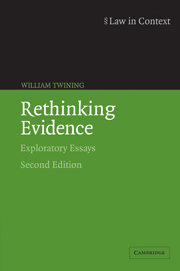Book contents
- Frontmatter
- Contents
- Preface
- Acknowledgements
- List of abbreviations
- Table of cases
- 1 Introduction: the story of a project
- 2 Taking facts seriously
- 3 The Rationalist Tradition of evidence scholarship
- 4 Some scepticism about some scepticisms
- 5 Identification and misidentification in legal processes: redefining the problem
- 6 What is the law of evidence?
- 7 Rethinking Evidence
- 8 Legal reasoning and argumentation
- 9 Stories and argument
- 10 Lawyers' stories
- 11 Narrative and generalizations in argumentation about questions of fact
- 12 Reconstructing the truth about Edith Thompson the Shakespearean and the jurist
- 13 The Ratio Decidendi of the Parable of the Prodigal Son
- 14 Taking facts seriously – again
- 15 Evidence as a multi-disciplinary subject
- Bibliography
- Index
15 - Evidence as a multi-disciplinary subject
Published online by Cambridge University Press: 15 December 2009
- Frontmatter
- Contents
- Preface
- Acknowledgements
- List of abbreviations
- Table of cases
- 1 Introduction: the story of a project
- 2 Taking facts seriously
- 3 The Rationalist Tradition of evidence scholarship
- 4 Some scepticism about some scepticisms
- 5 Identification and misidentification in legal processes: redefining the problem
- 6 What is the law of evidence?
- 7 Rethinking Evidence
- 8 Legal reasoning and argumentation
- 9 Stories and argument
- 10 Lawyers' stories
- 11 Narrative and generalizations in argumentation about questions of fact
- 12 Reconstructing the truth about Edith Thompson the Shakespearean and the jurist
- 13 The Ratio Decidendi of the Parable of the Prodigal Son
- 14 Taking facts seriously – again
- 15 Evidence as a multi-disciplinary subject
- Bibliography
- Index
Summary
This paper argues that the start of the Millennium is a particularly promising time to consolidate on recent developments in order to make Evidence a multi-disciplinary field in its own right with inferential reasoning at its core. It suggests that this field can be given coherence by adopting what David Schum has called a ‘substance-blind approach’ to inferential reasoning based on evidence. My vantage point and my bias are those of a jurist who has a special interest in evidence in law, but my objective is to make the case for a perspective that emphasizes common problems and concerns that transcend the boundaries of a wide range of disciplines.
The idea is not new. Bentham wrote: ‘The field of evidence is no other than the field of knowledge.’ He devoted his longest work to one part of that field, Judicial Evidence. Over two centuries there has grown up a massive theoretical and applied literature in many different contexts. Some of this transcends disciplinary boundaries, but in a spasmodic and patchy way. What is new is that in recent years evidence has gained an increasingly high public profile both in the media and academia in quite varied ways. Dope testing of athletes, authentication of art works, and problems of proving genocide feature in the news. DNA regularly hits the headlines. In popular fiction lawyer novelists have sometimes out sold writers of traditional detective and spy fiction.
- Type
- Chapter
- Information
- Rethinking EvidenceExploratory Essays, pp. 436 - 456Publisher: Cambridge University PressPrint publication year: 2006



